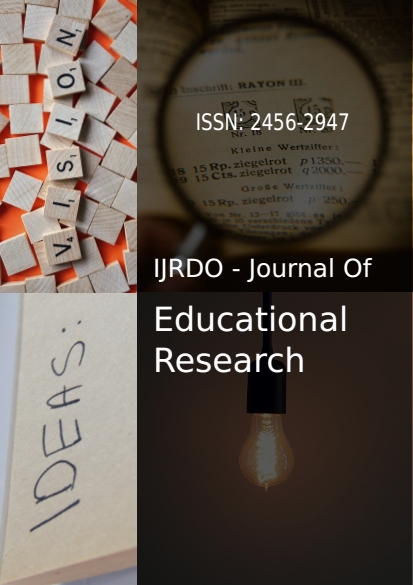A Budding “Good Practice”: Access to Quality, Non-Formal Education for Syrian Refugees in Lebanon
Abstract
According to a 2013 World Economic Forum report, Lebanon is ranked tenth in overall quality of education, and fifth in science and math. According to Muhammad Faour, a nonresident senior associate at the Carnegie Middle East Center in Beirut, "this assessment is a significant departure from the results of student achievement tests in every international test Lebanon and Qatar have participated in." The percentage of the population as a whole with at least some secondary education (aged 25 and above) is 54.2%. For the percentage of the female population with at least some secondary education, the figure drops to 38.8%. Amid this impressive and reputable system, Lebanon has suffered with waves of conflict, displacement, as well as asylum and refugee influxes which challenge this model and reputation of education each and every day. This paper looks into “good practice” in integrating the Syrian Refugee population into the educational system, as well as the model Lebanon has created in order to cope with almost an entire generation of illiteracy within its borders.
Downloads
References
UNICEF (2015), UNICEF Annual Report on Lebanon, Retrieved at: https://www.unicef.org/about/annualreport/files/Lebanon_2015_COAR.pdf
UNHCR (n.d.), United Nations Lebanon – UNHCR, Retrieved at: http://www.un.org.lb/subpage.aspx?pageid=78
Ahmad, N. & Shuayb, M. (2017), An Education for the Future: The Schooling Experience of Syrian Refugee Children in Lebanon and Germany, The Centre for Lebanese Studies with The Education Commission, Retrieved at: https://www.lebanesestudies.com/wp-content/uploads/2017/01/An-Education-for-the-Future.pdf
Children and Young People’s Commissioner Scotland (n.d.), Article 22, Retrieved at: https://www.cypcs.org.uk/rights/uncrcarticles/article-22
Reaching All Children with Education, Read more: http://racepmulebanon.com/
Berjaoui, R., El-Ghali, H. A., DeKnight, J. (2017), Higher Education and Syrian Refugee Students: The Case of Lebanon, Issam Fares Institute for Public Policy and International Affairs, American University of Beirut, Retrieved at: https://www.aub.edu.lb/ifi/Documents/publications/research_reports/2016-2017/20170702_refugee_education.pdf
LCPS (2016), Rapid Need Assessment of The Psychosocial Needs of Public Schools in Lebanon 2016, Retrieved at: https://www.lebanesestudies.com/rapid-need-assessment-of-the-psychosocial-needs-of-public-schools-in-lebanon-2016/
World Bank (2013), Lebanon Bears the Brunt of the Economic and Social Spillovers of the Syrian Conflict, Retrieved at: https://www.worldbank.org/en/news/feature/2013/09/24/lebanon-bears-the-brunt-of-the-economic-and-social-spillovers-of-the-syrian-conflict
UNHCR (2013), The Challenge of Education, Retrieved at: https://www.unhcr.org/FutureOfSyria/the-challenge-of-education.html
Copyright (c) 2020 IJRDO - Journal of Educational Research (ISSN: 2456-2947)

This work is licensed under a Creative Commons Attribution-NonCommercial-NoDerivatives 4.0 International License.
Author(s) and co-author(s) jointly and severally represent and warrant that the Article is original with the author(s) and does not infringe any copyright or violate any other right of any third parties, and that the Article has not been published elsewhere. Author(s) agree to the terms that the IJRDO Journal will have the full right to remove the published article on any misconduct found in the published article.



